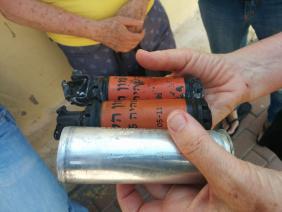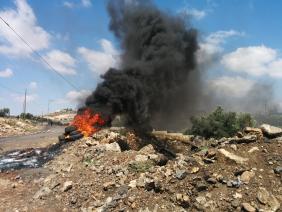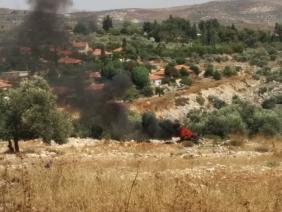Qaddum
The sun blazing overhead and the earth on fire…while elsewhere Sabbath arrives and the land is quiet…willingly blind.
There was a guy there who’d been a sniper in the army, he’d been coming to demonstrations for a while, standing and watching,

observing the snipers on the hill in their black uniforms. And S., the Palestinian, a local resident, was also there, and told us how during the week he and his friends collect money for next week’s demonstration. He’s been doing so four years.
Friday afternoon. We drive to the demonstration in Qaddum. We’re a bit late. It’s 1 PM and we’re still in Haja. It’s the hour men come from prayers in the mosque and begin getting organized for the demonstration. Suddenly an ambulance speeds quickly past us. We understood people have already been injured. We arrived at  the site fifteen minutes later. The soldiers were deep inside the village. In the homes and courtyards. Guarding the street along which the procession passes. Preventing the residents from demonstrating against the injustice done to them. The theater of the absurd at its height. We got out of the car. A strong odor of skunk liquid hit us.
the site fifteen minutes later. The soldiers were deep inside the village. In the homes and courtyards. Guarding the street along which the procession passes. Preventing the residents from demonstrating against the injustice done to them. The theater of the absurd at its height. We got out of the car. A strong odor of skunk liquid hit us.
On the other side of the street, on the road to the mosque, a large crowd. A Palestinian with a bullhorn calls to the soldiers at the  corner in Hebrew and Arabic. Shots are heard. It’s better to be out of their sight. We hear it was only forty minutes after the ambulance passed us at Haja that word was received the wounded arrived at the Nablus hospital. It turned out a roadblock was erected on the highway. The injured were forced to move to another vehicle and take an alternate route. They’re resourceful. We stand most of the time against the wall of a house, speaking to nearby demonstrators. There was a young man who’d been a sniper in the army and has been coming to the demonstrations for a long time… He stands watching the demonstration and looks at the snipers who find a good location in the window of one of the homes.
corner in Hebrew and Arabic. Shots are heard. It’s better to be out of their sight. We hear it was only forty minutes after the ambulance passed us at Haja that word was received the wounded arrived at the Nablus hospital. It turned out a roadblock was erected on the highway. The injured were forced to move to another vehicle and take an alternate route. They’re resourceful. We stand most of the time against the wall of a house, speaking to nearby demonstrators. There was a young man who’d been a sniper in the army and has been coming to the demonstrations for a long time… He stands watching the demonstration and looks at the snipers who find a good location in the window of one of the homes.
At one point we decide to enter the courtyard and walk to where we think the soldiers are. They’re everywhere, in the village lanes, the homes and the courtyards. The noise of stun grenades is deafening. An explosion, another explosion and another. The ambulance arrives. There are injured. Five. One seriously wounded in the abdomen. The others in the limbs. The soldiers fire .22’s and hard, cylindrical hollow rubber bullets. We were told they’re threaded in packs of ten and when fired scatter in all directions indiscriminately. We have the impression that soldiers are liable to appear from anywhere. It occurs to us the army may have decided to use the village as a training site for urban warfare. We decided to be careful and leave the courtyard. We moved away a bit and suddenly heard a powerful explosion in the courtyard we’d just left. Thick pale smoke wrapped the nearby buildings. Our experience tells us it’s the signal for the soldiers to withdraw. Their role in the performance is almost over. They have to prepare for the Sabbath. Snipers dressed in black are still on the hilltop. Waiting…it’s time for the final act of the weekly spectacle. The moment to set afire the tires bought and collected during the week. We join the villagers. A Palestinian flag flies from a pole by the roadside. It shows the wind is blowing eastward, toward Qedumim. Conditions are perfect for burning tires. There are a few piles. The fire is intense and consumes them quickly. Thick black smoke spreads toward Qedumim. The revenge of the occupied on the occupier. This has been going on for four years. The ancient Qaddum is struggling against Qedumim which only recently appeared, emerging and flourishing day after day with the army’s help.
And on the edge of the demonstration:
S., the Palestinian, tells us that on one of their incursions the soldiers collected all the tires they could lay their hands on. They also found the tractors used to transport them. The villagers are determined to maintain the ritual, had to obtain tires from elsewhere, paid a high price for them and also for transporting them. That’s why during the week he and others go from house to house to collect funds for the next demonstration.
Since our last visit three weeks ago the army comes each night to the village, disturbs the villagers’ rest and makes their lives and their nights unbearable. Not only Fridays are disrupted. No day is quiet.
And to make things more difficult, an innovation: roadblocks at the only exit the residents have today from the village – via Haja to Highway 55. The roadblocks are set up in the morning from 06:30 to 08:00 and at 15:00 in the afternoon. We promised to try to arrange shifts at the hours the roadblocks are in place.
